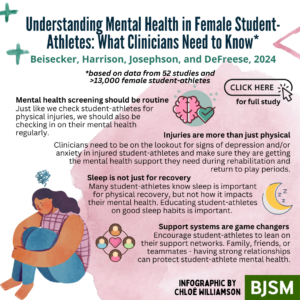Authors: Ling Beisecker, Patrick Harrison, Marzia Josephson, and J.D. DeFreese
When thinking about female student-athletes, we often picture the pinnacle of strength and resilience. In reality, many female student-athletes are battling mental health challenges like depression, anxiety, and stress that can affect both their performance and well-being. A recent systematic review and meta-analysis led by Ling Beisecker and colleagues has shed new light on just how widespread these issues are, and what can be done to better support these student-athletes. This research is important because it offers clinicians practical insights on how to improve care for female student-athletes.
Why is this study important?
While the mental health of student-athletes is getting more attention than ever, female student-athletes remain underrepresented in research. This is concerning because female student-athletes, particularly those competing in National Collegiate Athletic Association (NCAA) sports in the United States often experience a distinct set of pressures. Between the demands of academic life, intense physical training, and social expectations, it is no surprise that mental health struggles are common. But until now, we had not taken a comprehensive look at the specific factors contributing to these struggles.
This study provides a comprehensive review and analysis of existing literature about how factors such as injury, sleep patterns, and social support are associated with the mental health of female student-athletes. The findings expand our understanding and provide actionable recommendations for clinicians, coaches, and athletic staff to develop better support systems for female student-athletes.
How did the study team go about this
Wereviewed 52 studies, pulling together data from over 13,000 female student-athletes. Our goal was to identify the factors that most contribute to mental health issues like depression, anxiety, and stress. Our team looked at things like whether a student-athlete had experienced an injury, how well they were sleeping, and whether they had a strong support system. We then conducted a meta-analysis to find patterns across all these studies, giving them a big-picture view of the mental health landscape for female student-athletes.
What did the study team find?
The findings are clear: female student-athletes are particularly vulnerable to mental health issues, with certain factors making them even more at risk. Overwhelmingly, the research underscored how even identifying as female was associated with increased likelihood of depression, anxiety, and stress among student-athletes. The study also found that injuries, such as concussions, were a major predictor for mental health problems among female student-athletes. Additionally, female student-athletes who had poor sleep habits were more likely to experience depression and stress.
Alternatively, having a strong support system made an important difference for those sampled. Female student-athletes who had close relationships with teammates, coaches, and family members reported lower levels of mental health problems. This suggests that creating a supportive environment is essential for mental health.
What are the key take-home points?
So, what does this mean for clinicians and athletic staff working with female student-athletes?
Here are our four key recommendations:
- Mental health screenings should be routine: Just like we check student-athletes for physical injuries, we should also be checking in on their mental health regularly. This is especially important for student-athletes dealing with injuries or showing signs of stress.
- Injuries are more than just physical – they impact body and mind: We know concussions and other injuries can derail a student-athlete’s season, but they can also have long-lasting effects on mental health. Clinicians need to be on the lookout for signs of depression and/or anxiety in injured student-athletes and make sure they are getting the mental health support they need during rehabilitation and return to play periods.
- Sleep is not just for recovery—it is for mental health, too: Many student-athletes know sleep is important for physical recovery, but not enough are thinking about how it impacts their mental health. Educating student-athletes on good sleep habits can go a long way in preventing mental health issues.
- Support systems are game changers: Encourage student-athletes to lean on their support networks. Whether it is family, friends, or teammates, having strong relationships can help buffer against the mental health challenges that come with being a student-athlete.
The Bottom Line
Mental health is not a secondary issue for female student-athletes—it is central to both their well-being and performance. By taking a proactive approach to mental health, clinicians and athletic staff can play an important role in helping these student-athletes thrive both on and off the field. Small changes, whether it is incorporating mental health screenings, emphasizing the importance of sleep, or fostering supportive environments, can make a big impact.
This is a call to action for those who work with female student-athletes to start treating mental health like the vital part of athletic care that it is—and give our female student-athletes the support they deserve.
